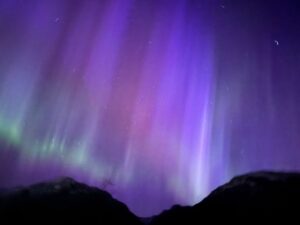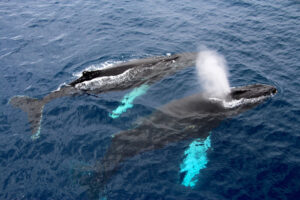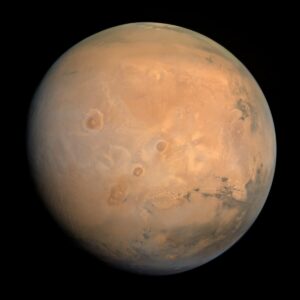A passion for the natural world drives many of our adventures. And when we’re not outside, we love delving into discoveries about the places we live and travel. Here are some of the best natural history links we’ve found this week.
Gender-switching fish
The rainbow fish that changes gender: The rose-veiled fairy wrasse lives in the twilight zone around the Maldives. Mainly found between 40m and 70m, they exist at an awkward depth that is too shallow for submersibles and too deep for most scuba divers to survey.
A group of deep-sea divers wanted to know more about the coral reefs in this zone so they used special gear to dive to 100m. This allowed them to examine the rose-veiled fairy wrasse.
Scientists first discovered the brightly colored fish in 2022. Like other species of wrasse, they are born female and become male as they age. In the process of changing sex, they become more colorful to attract female partners.

The Pillars of Creation. Photo: NASA
Pillars of Creation caught on camera: Astronomers first observed the Pillars of Creation using the Hubble Space Telescope. The James Webb Space Telescope has now captured them in even more detail.
The Pillars are column-shaped clouds of interstellar dust and gas in the Serpens constellation, 7,000 light-years away. The new images reveal hundreds of newborn stars within the clouds.
The James Webb Space Telescope can detect infrared light and has allowed astronomers to see proto-stars coming to life.
Stepping together
Chimpanzees synchronize their steps: Humans subconsciously synchronize their steps when walking with others. In daily life, humans actively synchronize when playing sports, dancing, or performing joint actions, such as two people carrying a heavy object.
Researchers have discovered that chimpanzees display the same trait, even though they do not use joint actions as often as we do. When they walked together, 79% of chimpanzees synchronized their leading foot within 0.5 seconds.

Photo: Shutterstock
A planet with the density of a marshmallow: Planet TOI-3757b apparently has the density of a marshmallow. The mushy interstellar body lies 580 light-years from Earth in the constellation Auriga.
Though it is larger than Jupiter, its density of 0.27 grams per cubic centimetre puts it at one-quarter of the density of water. If placed in a large enough body of water, the planet would float!
Scientists think this odd density is the result of its orbit around a red dwarf star. However, they are still trying to understand how the planet formed. Though a red dwarf is colder than our sun, it can erupt with powerful flares, making it difficult for planets to form around one.
The 700-year-old Black Death still affects your health: Though Black Death spread through Europe in the 1300s, it is still affecting our health today.
The plague, which killed as many as 200 million people, has impacted human evolution. Researchers studied the teeth of 206 ancient skeletons. They found that the gene ERAP2 was central to survival during the plague.
If you had the correct mutation of ERAP2, you were 40% more likely to survive the pandemic. “It’s a huge effect, it’s a surprise to find something like that in the human genome,” Professor Luis Barreiro said.
The survivors passed this gene to their children. Over three generations, a 10% shift could be seen. “It’s the strongest selection event in humans to date,” evolutionary geneticist Hendrik Poinar explained.
On the negative side, this mutation that helped our ancestors survive the Black Death makes us more vulnerable to certain autoimmune diseases today.
New species of whale hiding in plain sight
New species of whales found in U.S. waters: Last year, scientists discovered a new species of whale in U.S. waters. Rice’s whale is endemic to the northeastern Gulf of Mexico.
Previously, scientists identified the whales as Byrde’s whales, but when one recently washed up on shore, a closer look proved that the animal was morphologically and genetically different. It is now classed as a different species.
Since the discovery, over 100 scientists have signed an open letter to President Biden, imploring him to protect the new species. The whales are critically endangered, with only 51 individuals left. Their habitat is under constant threat from boat traffic and oil and gas exploration.






